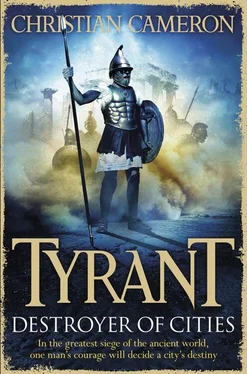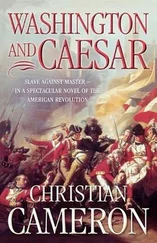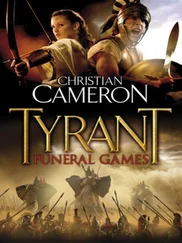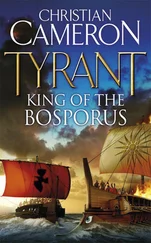Christian Cameron - Destroyer of Cities
Здесь есть возможность читать онлайн «Christian Cameron - Destroyer of Cities» весь текст электронной книги совершенно бесплатно (целиком полную версию без сокращений). В некоторых случаях можно слушать аудио, скачать через торрент в формате fb2 и присутствует краткое содержание. Год выпуска: 0101, Издательство: Orion Books, Жанр: Исторические приключения, на английском языке. Описание произведения, (предисловие) а так же отзывы посетителей доступны на портале библиотеки ЛибКат.
- Название:Destroyer of Cities
- Автор:
- Издательство:Orion Books
- Жанр:
- Год:0101
- ISBN:нет данных
- Рейтинг книги:5 / 5. Голосов: 1
-
Избранное:Добавить в избранное
- Отзывы:
-
Ваша оценка:
- 100
- 1
- 2
- 3
- 4
- 5
Destroyer of Cities: краткое содержание, описание и аннотация
Предлагаем к чтению аннотацию, описание, краткое содержание или предисловие (зависит от того, что написал сам автор книги «Destroyer of Cities»). Если вы не нашли необходимую информацию о книге — напишите в комментариях, мы постараемся отыскать её.
Destroyer of Cities — читать онлайн бесплатно полную книгу (весь текст) целиком
Ниже представлен текст книги, разбитый по страницам. Система сохранения места последней прочитанной страницы, позволяет с удобством читать онлайн бесплатно книгу «Destroyer of Cities», без необходимости каждый раз заново искать на чём Вы остановились. Поставьте закладку, и сможете в любой момент перейти на страницу, на которой закончили чтение.
Интервал:
Закладка:
‘You want to do it, lord?’ Draco asked.
Satyrus didn’t pretend. ‘Yes!’ he said, and placed himself behind the frame, his hand on the releasing handle.
‘Stand a little clear, like this. Sometimes a string breaks, or the winches give way. Either way, you don’t want to be right behind her, the bitch.’ Draco nodded.
Satyrus ignored him, to line up his shot. ‘Ready to shoot,’ he said.
Draco stood back.
Satyrus pulled the handle and the spear flashed away, so fast that none of them could trace its flight. The frame shook and twisted on its pin, and the deck groaned, and the arms of the heavy bow made a curious thwack as they hit the limit of their travel.
The spear vanished. It went far enough that none of them saw the fall of the shot, and they all stood around, disappointed.
Neiron shook his head. ‘Look at that,’ he said. He pushed against the weapon’s frame, and it tilted.
One shot had bent the pin on which it rotated.
‘Thetis’ glittering breasts!’ Draco said.
‘Best put it on a fixed frame until we can get ourselves a bronzesmith,’ Satyrus said. He was watching the ambassador’s ship. ‘How many men do we have who can use these things accurately?’
Neiron snorted.
‘Looks to me as if we need to have trained crews,’ Satyrus said. ‘And targets on the shore. And contests and prizes. We go to sea in two weeks. I’d like us to be able to hit something.’
Neiron nodded. ‘And what will one of these here spears do to a ship?’ he asked. ‘Anything?’
Draco nodded. ‘Marines?’
Satyrus and Neiron nodded. Diokles shook his head. ‘Better train some sailors, too.’
Satyrus left them debating where they should hold the drills. He was in a much better mood, although as usual, these days, part of his mind was calculating the cost of exercising the new weapons, with the spears at two and a half drachma each (a day’s wage for an oarsman).
He consoled himself that the price was far lower than the value of the loss of a merchant ship. And then he went back to worrying about warehouse space and which towns needed better water supplies.
Two weeks and I’ll be at sea, and will leave all this behind me , he thought.
3
Melitta sat on a stool covered in furs, wearing her best silvered-bronze scale and her favourite white caribou-hide boots and her mother’s caribou coat over her armour. Despite the stool, she sat with her back straight. Her right hand was supported by her mother’s sword, which, according to Assagetae tradition, had been taken as spoils from Cyrus the Great after a battle in the distant past.
Behind her stood — or sat — her bodyguard, twenty young knights of her own household led by her lover, Scopasis, who stood at her side like a heavily muscled statue.
Arrayed in front of her were ten days of heavy work — the men and women of the Assagetae who had brought their cases to her to plead. It was the spring gathering of the Assagetae in their ‘city’ of dykes and temporary walls, hidden in the upper reaches of the Borysthenes River where most Greeks had never travelled.
Merchants had been arriving for days. Hundreds of them: swordsmiths and goldsmiths and fine potters and leatherworkers from as far away as Athens and Alexandria, lured by the promise of rich profits and a sense of adventure. The Tanja of the Assagetae was like a combination of law court, agora and religious festival, with a trade fair thrown in for entertainment. There were twenty thousand tribesmen and women in the dykes, their great herds penned, tribe by tribe, with two hundred thousand horses and twice as many sheep spread over hundreds of stades. Cattle wandered from encampment to encampment, lowing loudly, eating whatever grass was already available, watched by children whose attention was more on the wonder of the Aegyptian priest and his wagon than on their charges. Horses trumpeted to each other — uncut stallions roared with irritation at the smell of so many other strange stallions, and mares rolled their lips back in scent-inspired appreciation of all the possibilities. Adolescent warriors of both sexes did approximately the same as their horses.
Melitta could remember coming to the Tanja with her mother: the adulation of the adults, the praise for her six-year-old accomplishments, the wonder of the trade fair, the fine horses and the beautiful clothes. But mostly she could remember her mother’s disgust that her people could behave so often like fools, and her annoyance at dealing with their failings in the giving of law. Adultery, drunkenness, child abandonment, horse-thieving, witchcraft, murder — she heard them all.
Are you children? her mother would often ask of the men and women brought before her.
Her attention snapped down to a pair of her own tribesmen — Cruel Hands — veterans of her summer campaigns of three years before, and men who had ridden to raid the Sauromatae these last two years. Impatient with a grain trader, they had killed him and taken his mules and his goods.
‘He was trying to cheat us!’ the shorter one said, as if this made it all right.
‘You murdered a foreign merchant in cold blood,’ answered Kairax. He was their immediate lord and was acting for the merchants.
‘Wasn’t cold blood!’ shouted the bigger of the two. ‘I was mad as fuck!’
‘Are you two children?’ Melitta snapped. For a moment she paused because she heard her mother’s voice emerge from her own lips. ‘He made you angry, so you killed him?’
‘He was cheating us,’ the smaller man said again.
Melitta took a deep breath. She looked at Kairax. ‘What do the merchants want?’
‘Restitution,’ Kairax said. ‘Fifty horses for the life of the man, twenty more for his goods.’
‘By the Heavenly Archer!’ the smaller man said.
‘That fuck wasn’t worth no fifty horses,’ said the bigger man.
Melitta’s eyes strayed around the enclosure. Carpets — fine carpets — hung on three sides of her, blocking the chill spring wind, separating her deliberations from the riot of the market on the far side of the barrier, although all Sakje were welcome and several hundred of them crowded around, more than a few on horseback.
Her wandering eyes crossed with Scopasis’, and she smiled at him — an automatic smile, as she was beginning to doubt the wisdom of taking him as a lover. He was brave — loyal — and deeply in love with her.
She sighed inwardly, and thought about how easy it would be to be a bad queen; to ignore these petty cases, give quick judgements and be free to roam the booths, spending her riches on golden cones to hang tinkling at the edge of her caribou coat, or fine saddles-
Drakas. That was the short one’s name. He’d been with her in the last charge at Tanais River when all the tribes became intermixed. But she could remember his ugly nose under his helmet, and his grin.
‘Drakas,’ she said.
He stiffened. ‘Lady?’
‘Drakas, how many horses do you own?’ She leaned forward and pointed her mother’s sword at him. ‘How many?’
‘More than a hundred,’ he admitted.
‘And this lout?’ she asked. She didn’t really know his companion.
The big man shrugged. ‘A dozen,’ he admitted.
She shook her head. Drakas had enough horses to be treated as a nobleman, but his friend did not. She suspected that this apparent inequality had something to do with the killing — and she further suspected that Drakas’ success as a hunter and raider had something to do with the fact that Kairax was willing to see him punished. Rivalry? Jealousy?
You’re like children.
‘Who struck the killing blow?’ she asked.
Drakas shrugged. ‘I did,’ he admitted, pursing his lips. He spat. Among Sakje, that wasn’t a gesture of disrespect — she needed to remember that. Among Sakje, he was being contemplative and polite.
Читать дальшеИнтервал:
Закладка:
Похожие книги на «Destroyer of Cities»
Представляем Вашему вниманию похожие книги на «Destroyer of Cities» списком для выбора. Мы отобрали схожую по названию и смыслу литературу в надежде предоставить читателям больше вариантов отыскать новые, интересные, ещё непрочитанные произведения.
Обсуждение, отзывы о книге «Destroyer of Cities» и просто собственные мнения читателей. Оставьте ваши комментарии, напишите, что Вы думаете о произведении, его смысле или главных героях. Укажите что конкретно понравилось, а что нет, и почему Вы так считаете.












